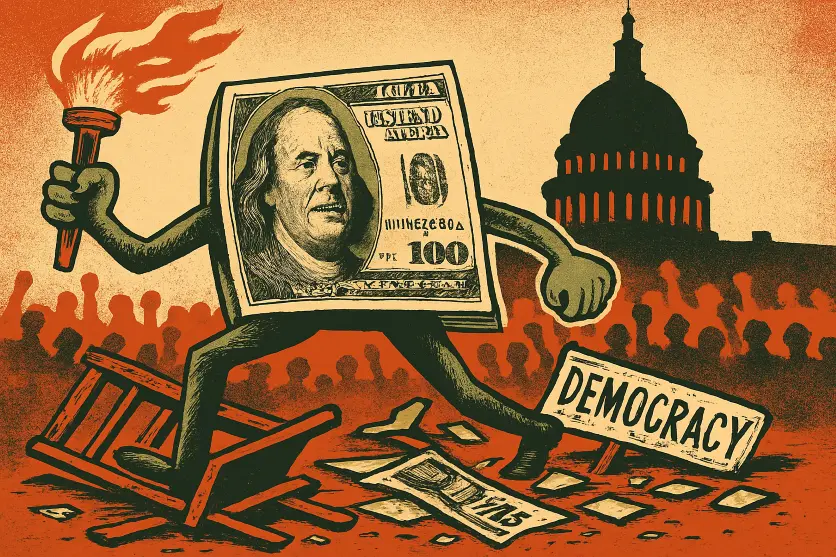
Foreign funds from USAID, Ford Foundation, and others reshape democracies under the guise of aid, fuelling betrayal and deep state influence across nations
Dollar-The Currency of Corruption: When Loyalty Is for Sale
Dollar Diplomacy or Democratic Deception? How Foreign Funds Breed Betrayal Across Borders – In today’s global landscape, the dollar isn’t just a currency, it’s a weapon. It seduces, infiltrates, and reshapes loyalties across caste, creed, nationality, and religion. The metaphor “Dollar is a powerful sperm that can produce traitors” may sound provocative, but it captures a brutal truth: foreign money can impregnate institutions with greed, override values, and birth betrayal.
From media houses to civil society groups, the dollar has quietly entered spaces where only duty should reside. The result? A growing class of elites who speak the language of democracy but serve foreign interests. Whether it’s lobbying for external agendas, pushing divisive narratives, or undermining national sovereignty, the price of betrayal is often paid in grants, fellowships, and “development aid.”
Deep State Designs: Democracy or Domination?
Behind the façade of humanitarian aid and democratic support lies a complex machinery often referred to as the “deep state”, a network of intelligence agencies, think tanks, and philanthropic fronts that shape global narratives. Organizations like USAID and the Ford Foundation have long been accused of operating as soft-power arms of U.S. foreign policy.
For example, USAID’s “Democracy Delivers” initiative mobilized over $517 million to support countries experiencing “democratic openings”. While the stated goal is to strengthen civic engagement, critics argue that such funding often targets governments that resist Western influence, subtly steering them toward policy alignment with U.S. interests.
The Ford Foundation, too, committed $20 million to support democratic transitions in countries like Nepal, Moldova, and Zambia. But history tells a more complicated story. In India, the Foundation’s early involvement in rural development and education was later revealed to be part of a broader strategy to influence policy and culture, a shadow empire built on soft intervention.
These efforts are rarely neutral. They often coincide with strategic goals: securing trade routes, controlling agricultural systems, or influencing election outcomes. The language of “better living” and “democratic resilience” becomes a cloak for geopolitical maneuvering.
Global Case Studies: When Aid Becomes Intrusion; When Patriotism Loses to Profit
- India: USAID and Ford Foundation have been linked to covert operations that shaped education, agriculture, and civil society in alignment with U.S. interests. From the PL-480 food grain deal to the Rockefeller seed programs, aid often came with strings attached.
- Africa: Foreign-funded NGOs have influenced constitutional reforms, often sidelining local voices in favour of donor-driven agendas.
- Latin America: In countries like Guatemala and Ecuador, USAID-backed programs have been accused of interfering in electoral processes under the guise of democratic support.
- Asia: In countries like Pakistan and Sri Lanka, Bangladesh and Nepal foreign funds have led to strategic compromises, with ports and infrastructure falling under foreign control.
- Europe & US: Even in wealthy nations, lobbying and campaign donations blur the line between public service and private gain.
In each case, the dollar doesn’t just fund development it funds influence. And influence, when unchecked, can erode sovereignty.
The Real Question: Can We Immunize Minds Against Money?
If money can “impregnate” minds with betrayal, what’s the antidote? Transparency, media literacy, and ethical leadership are key. But so is public vigilance. Citizens must ask: Who funds the voices we trust? What interests lie behind the headlines?
True patriotism resists temptation. It questions power, protects the vulnerable, and defends national dignity. In a world where foreign aid often comes with hidden agendas, we must learn to decode the language of “support” and distinguish between genuine help and strategic intrusion.
Final Thought:
The dollar may be powerful, but it’s not invincible. Betrayal may be born in bank accounts, but integrity is nurtured in conscience. Let’s invest in that and guard our democracies not just with ballots but with awareness.
Also read: Trump’s Travel Ban: Why Pakistan Was Spared & The Deep State Theory Behind It
Stay informed with the latest news and updates – only on Rapido Updates.